 A long long time ago, I can still remember…
A long long time ago, I can still remember…
And the three men I admire mostThe Father, Son, and the Holy GhostThey caught the last train for the coastThe day the music died…
Most fairy tales begin with the following words; ‘Once upon a time…’ or ‘A long, long time ago…’ Even Hollywood has followed in that tradition, with movies like Star Wars beginning with the screen crawl that reads, “A long time ago, in a galaxy far away…” Although this tale does not begin in the outer reaches of the galaxy, it does begin a long time ago; in 1776 to be exact.
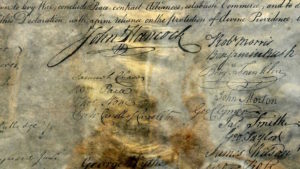 Our tale begins when 56 men signed their names to a document in which they pledged their lives, their fortunes, and their sacred honor to uphold a set of beliefs that were, quite radical, revolutionary even, for the time. Their beliefs are summed up in the following passage from the document they pledged to support at the cost of their lives, “…that all men are created equal, that they are endowed by their Creator with certain unalienable Rights, that among these are Life, Liberty and the pursuit of Happiness. — That to secure these rights, Governments are instituted among Men, deriving their just powers from the consent of the governed…”
Our tale begins when 56 men signed their names to a document in which they pledged their lives, their fortunes, and their sacred honor to uphold a set of beliefs that were, quite radical, revolutionary even, for the time. Their beliefs are summed up in the following passage from the document they pledged to support at the cost of their lives, “…that all men are created equal, that they are endowed by their Creator with certain unalienable Rights, that among these are Life, Liberty and the pursuit of Happiness. — That to secure these rights, Governments are instituted among Men, deriving their just powers from the consent of the governed…”
Although it is important to know, and understand, those principles, what is truly important it is the fact that it was supposedly upon those principles that this country was founded; they formed the building blocks, the foundation, of their hopes and aspirations for this country. I find it sad that people have forgotten/forsaken those beliefs, yet they do not hesitate to celebrate the holiday dedicated to what those men risked their lives to defend.
It has been nearly two and a half centuries since those men risked so much for their freedom, and that of their posterity. While we celebrate their words and deeds every July 4, the real question is, do we honor them by upholding what they fought so hard to obtain? I’ll be the first to tell you that I fall short of honoring the sacrifices they made on my behalf, and if I say that about myself, what does that say about those who are not as radical and outspoken as I am?
What really angers me is when I hear people boasting about how free they are; yet if you were to ask them to describe freedom; most would be unable to provide an accurate description of what freedom is. As von Goethe said, “None are more hopelessly enslaved than those who falsely believe they are free.” If you cannot define freedom, then how do you know if you are free?
Therefore, I would like to run a little experiment; I would like you to stop reading for a moment and think about how you would define freedom; without the aid of Google or a dictionary. I want you to use your own words to describe it, and to make matters interesting, I want you to try and do it in ten words or less. You might think it cannot be done; freedom cannot be described in so few words. I thought that some might say that, so in preparation for this essay, I tried the experiment myself, and found I could do it in 5 words, “The ability to say no.”
Before anyone says that my description is ridiculous, pause and think about it for a moment. If someone tells you that you must do something, and you cannot say no to them, are you truly free, or are you subject to the will of those who tell you what you must, and must not do? Using that to describe freedom, allow me to provide a few examples of why we are anything but free in America today.
Let us begin with something relatively simple; how many things can you name that require a permit or license for you to do? If you want to drive, you must obtain a license and register your vehicle. If you want to get married, you must obtain a license. If you want to open a business, you must get a license. If you want to hunt or fish, you need a license. If you want to practice medicine, you must get a license, and the list goes on and on. Can you say ‘No’ to the requirement that you obtain a license before you are allowed to do those things? You can try, but good luck with that.
So, you are not as free as you first thought you were, are you?
What about your income, are you free to keep it and spend it as you see fit without government taking their fair share? Can you refuse to pay taxes without fear of punishment? Can you tell government that you do not consent to how your tax dollars are being spent; that you disagree with the programs it is using them to fund, or that you do not consent to those programs because you find them morally reprehensible? While there are those who do not pay their taxes, and get away with it, the simple fact is that you cannot say ‘No’ to them when it comes to collecting taxes from you.
What about government itself? The Declaration of Independence does say that government derives its authority from the consent of the governed, doesn’t it? Can you say ‘No’ to its authority? Can you say that since you have never consented to it that the laws it passes do not apply to you? If the Civil War taught us anything, it is the fact that our government will not allow a portion of the people to revoke their consent to being governed by and institution they had no hand in establishing; one which they DO NOT consent to.
I have one more example for you, and I am sure that this one is going to ruffle a few feathers. Imagine for a moment that you are walking down a sidewalk, minding your own business, and a police officer stops you and asks to see your ID. I want you to freeze this moment in your mind and think about it. You have done absolutely nothing wrong, and there was no reason for this policeman to stop you and ask to see your ID.
Now tell me, are you free to say ‘No’ to the policeman and continue on your way down the sidewalk? Good luck with that Sparky! There are probably some who say that you should not be such an asshole; that you should just show your damned ID; what’s the big deal? These are liable to be the same people who say that if you do not have anything to hide, you have nothing to worry about; in regards to the NSA’s extensive surveillance of the American people. These people also fail to get the point; which is that if you have done nothing wrong, no one, not me, not the government, not society, and certainly not the police, have any right to hassle you, or infringe upon your freedom; deny you the right to say ‘No’ to them.
If this last scenario were to happen to you, you will have come face to face with government’s true nature; it is force, it is them demanding that you comply; it is government denying you the most important of all your freedoms – the freedom of choice. If you cannot choose to say ‘No’, if you cannot choose not to comply, then you are not truly free; which proves that my definition of freedom is more accurate than you first thought.
Since I did one experiment, let’s try another. I would like for you to complete the following sentence for me; “A right is something _______.” Unless you send me an e-mail with the completed sentence, I will never know how you respond; so let us just move forward with my thoughts on it. The former Attorney General, John Ramsey, gave a pretty good description, and I would like to share it with you now, “A right is not what someone gives you, it’s what no one can take from you.”
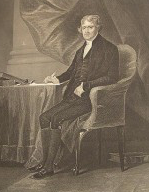
Thomas Jefferson
What is a right? A right is a thing that the individual can do without restriction or restraint. Our rights do not come from government, therefore government cannot take them away from us, or limit our ability to exercise them. Our rights are inherent and unalienable; meaning that they are as much a part of our being as are our lungs, our heart, and our brain, and to deny or restrict them is to deny our humanity. Although he speaks in the general term of liberty, Thomas Jefferson once wrote, “Liberty is to the collective body, what health is to every individual body. Without health no pleasure can be tasted by man; without liberty, no happiness can be enjoyed by society.”
You cannot claim to have liberty when there exists a group of men, or an entity, that denies the people their individual rights. If you equate liberty to freedom, then it becomes abundantly clear that society cannot be truly happy as long as a system of government exists that believes, or is told by the people it represents, that it needs to limit and restrict the liberty and individual rights of certain segments of society.
I know I harp on this endlessly, but one of the primary reasons this country is in such bad shape is because we cannot, collectively, come to any kind of agreement as to what function government is supposed to serve. The two political parties claim to be polar opposites; each believing that government should serve certain specific functions; yet both support measures that restrict the rights and liberty of the people. The voters fight amongst one another over what government should be doing on their behalf; yet nary a word is said about restoring the rights and liberty their government has deprived them of the ability to enjoy.
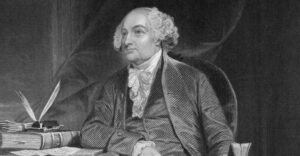
John Adams, Patriot
That is why it is so critical to understand what function people want government to serve; which is where the Declaration of Independence comes into the picture; it tells us what function it is supposed to serve. I hear all this talk of reforming, or altering our current system of government; yet it is all futile unless people can come to an agreement as to what function government should serve. As John Adams stated, “We ought to consider what is the end of government, before we determine which is the best form.”
As long as it is admitted that the property, rights and liberty of people can be taken if it serves the public good, then government will always be tyrannical, and it will NEVER serve the function outlined in the Declaration of Independence; which is why I refuse to engage in any discussions regarding how to fix our current situation until people accept that the ONLY function government should serve is the preservation of the right to life, property, and liberty of all the people…equally.
People generally accept that the power exercised by their government is derived from them; even though they may believe that their power is confined to specific partisan ideologies; the left/right paradigm. What people won’t accept is that we, either individually or collectively, cannot authorize government to do anything that we, as individuals, cannot do without committing a crime.
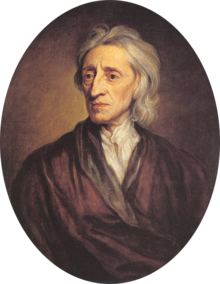
John Locke
John Locke explains that principle in Section 135 of his Second Treatise, “Though the legislative, whether placed in one or more, whether it be always in being, or only by intervals, though it be the supreme power in every commonwealth; yet:
First, It is not, nor can possibly be absolutely arbitrary over the lives and fortunes of the people: for it being but the joint power of every member of the society given up to that person, or assembly, which is legislator; it can be no more than those persons had in a state of nature before they entered into society, and gave up to the community: for no body can transfer to another more power than he has in himself.”
Prior to that, in Section 124, Locke explains why men enter into civil and political societies; in other words, the function government is supposed to serve, “The great and chief end, therefore, of men’s uniting into commonwealths, and putting themselves under government, is the preservation of their property. To which in the state of nature there are many things wanting.”
When Locke says that there are many things wanting in a state of nature, he means that in a state of nature the ability of the individual to defend that which is rightfully theirs is tenuous, at best. In a state of nature the strong may threaten the weak, the many may threaten the few; so people join together and form governments to better secure that which is rightfully theirs; that which they have the natural right to defend.
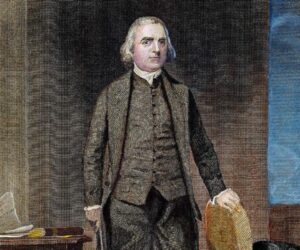
Samuel Adams
In 1772, Samuel Adams spoke of this natural right to defend what rightfully belongs to the individual when he wrote, “Among the Natural Rights of the Colonists are these First. a Right to Life; Secondly to Liberty; thirdly to Property; together with the Right to support and defend them in the best manner they can–Those are evident Branches of, rather than deductions from the Duty of Self Preservation, commonly called the first Law of Nature.”
There we have one of the key figures from the Revolutionary War era telling us that it is man’s natural right to defend their life, liberty, and property. Therefore, as individuals, we cannot create a system of government that seeks to deprive the people of that which it is their individual right to protect; it makes no sense and to believe otherwise is a contradiction of beliefs.
A century and a half after Locke wrote his Second Treatise, a Frenchman by the name of Frederic Bastiat explained the same principles when he wrote, “What, then, is law? It is the collective organization of the individual right to lawful defense.”
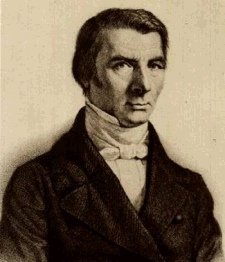
Bastiat
He then goes on to explain that statement in more detail, “Each of us has a natural right—from God—to defend his person, his liberty, and his property. These are the three basic requirements of life, and the preservation of any one of them is completely dependent upon the preservation of the other two. For what are our faculties but the extension of our individuality? And what is property but an extension of our faculties?”
Finally, he explains the purpose for which governments are instituted, “If every person has the right to defend—even by force—his person, his liberty, and his property, then it follows that a group of men have the right to organize and support a common force to protect these rights constantly. Thus the principle of collective right—its reason for existing, its lawfulness—is based on individual right.”
However, Bastiat does not stop there, he goes further by saying, “And the common force that protects this collective right cannot logically have any other purpose or any other mission than that for which it acts as a substitute. Thus, since an individual cannot lawfully use force against the person, liberty, or property of another individual, then the common force—for the same reason—cannot lawfully be used to destroy the person, liberty, or property of individuals or groups.”
This is why I do not vote, nor do I consent to this system of government. I may not gain my freedom by doing so, but I refuse to participate in selecting people who will then go on to pass laws that further restrict what little freedom I have left. It is also why I refuse to engage in any debate with anyone over how to fix things in this country until they publicly accept that the ONLY function government should serve is the securing of the rights and liberty of each, and every, individual in America.
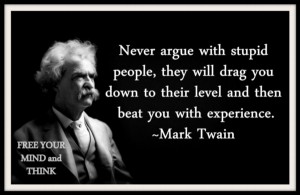 The dream that was America died in 1789 when the Constitution was ratified and this system of government went into effect. It is a fairy tale, a myth, that this system exists to secure your rights and liberty. It is also a fairy tale that it can be fixed by voting. As Mark Twain so aptly said, “If voting made any difference, they wouldn’t let us do it.”
The dream that was America died in 1789 when the Constitution was ratified and this system of government went into effect. It is a fairy tale, a myth, that this system exists to secure your rights and liberty. It is also a fairy tale that it can be fixed by voting. As Mark Twain so aptly said, “If voting made any difference, they wouldn’t let us do it.”
As long as people continue to support this system; as long as people continue to think that either the Democrats or the Republicans stand for the same principles and beliefs enshrined in the Declaration of Independence, then the people will remain trapped in a prison of their own making. As Ramsey Clark said, rights are those things no one can take from you; but that does not mean they cannot try; and as long as people willingly submit to those who seek to take those rights away, people will never get them back; essentially losing them forever.
I do not know what else I can say, or how to say things differently so I can penetrate through the indoctrination that people have undergone. I feel like I am a broken record, repeating the same things over and over again…to a deaf audience. I am about ready to toss in the towel; to sit back and silently mourn while the country I love sinks deeper into the depths of despotism.
We are near the end folks; it is on the horizon creeping towards us, and most people cannot see it. As George Washington once told his troops, “The time is near at hand which must determine whether Americans are to be free men or slaves.”
The outcome rests in your hands; which will you choose is the million-dollar question…but to quote Patrick Henry, “Give me liberty or give me death.”
December 11, 2022
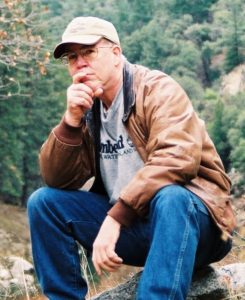
~ The Author ~
Neal Ross, Student of history, politics, patriot and staunch supporter of the 2nd Amendment. Send all comments to: bonsai@syix.com.
Life continues to expand for this prolific writer and guardian of TRUE American history.
